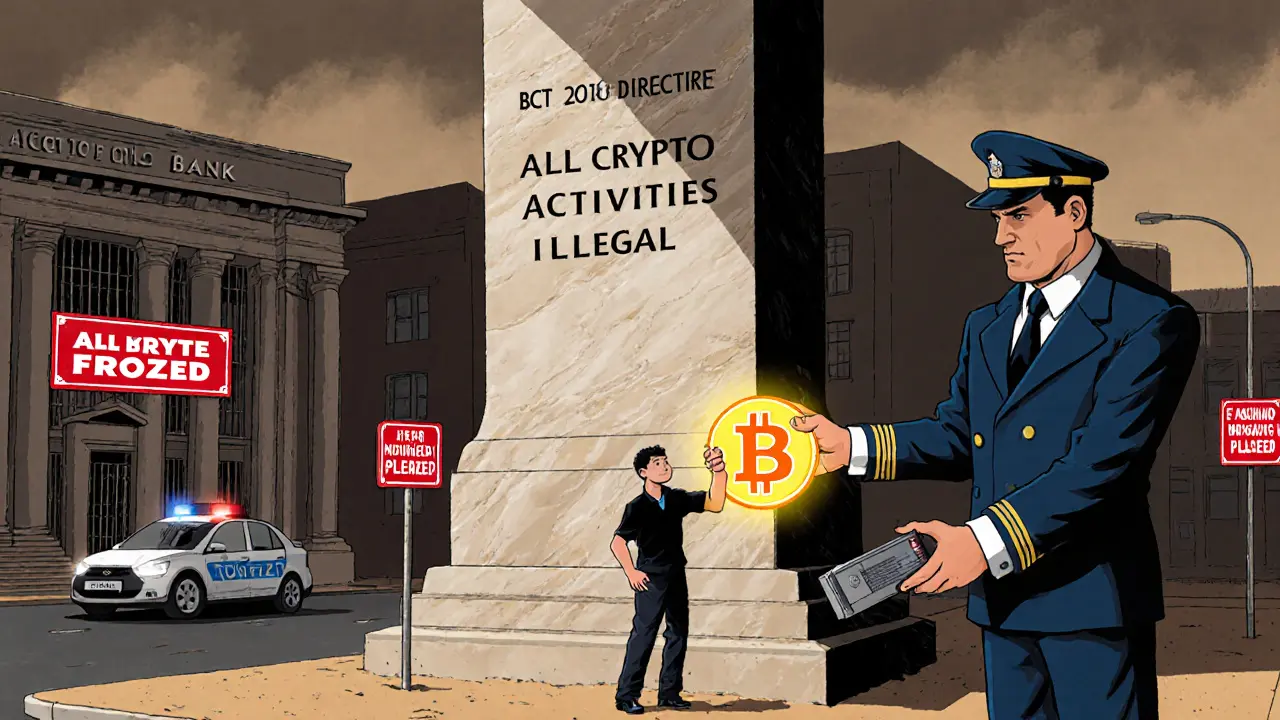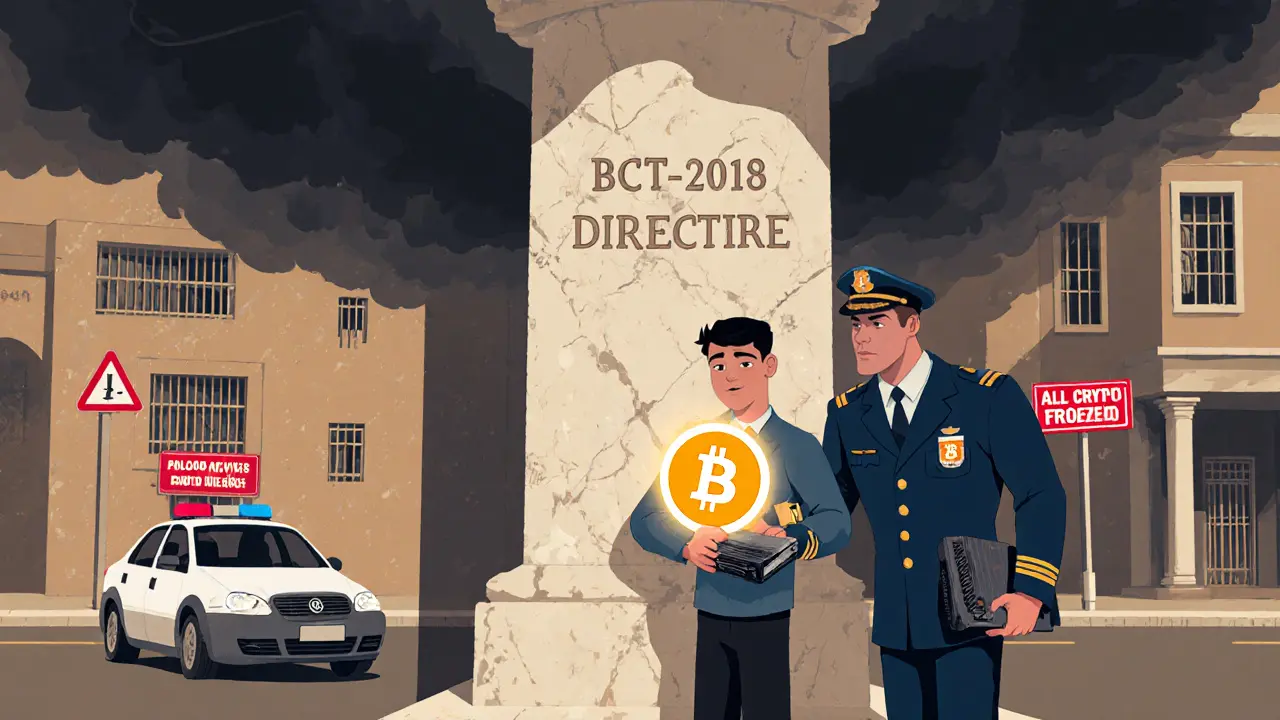Tunisia Crypto Penalty Calculator
Tunisia Crypto Penalty Calculator
Calculate potential legal consequences for crypto activities in Tunisia based on the 2018 BCT directive.
Potential Consequences
Maximum imprisonment:
Warning: All crypto activities are illegal under Tunisia's 2018 BCT directive. These penalties represent maximum legal consequences.
Key Takeaways
- All crypto activities are illegal in Tunisia under the 2018 BCT directive.
- Violations can bring up to five years imprisonment and heavy fines.
- Customs can seize mining hardware; banks must block crypto‑related transfers.
- Only a narrow sandbox permits permissioned blockchain projects, not public trading.
- Most safe strategy for individuals is complete avoidance or use of offshore services - both still risky.
In 2025 Tunisia cryptocurrency regulation continues to be one of the world’s strictest bans on digital assets. The Central Bank of Tunisia (Central Bank of Tunisia BCT) issued a 2018 directive that criminalises every form of crypto‑related activity - from buying and selling to mining and using coins for payments.
What the Law Actually Says
The legal framework is built on three pillars:
- The BCT 2018 directive that bans all unauthorized virtual‑money transactions.
- The Financial Market Council (CMF), which oversees capital‑market rules and would have to approve any token offering - something it has never done.
- The National Anti‑Money‑Laundering Commission (CTAF), tasked with AML monitoring and reporting suspicious crypto activity.
Every crypto transaction that bypasses these bodies is automatically deemed a criminal act. There is no legal “grey‑area” for personal use; the law treats crypto as illegal virtual money.

Penalty Landscape
Anyone caught breaking the ban faces harsh sanctions. The penalties are outlined in Tunisia’s currency‑control code and include:
| Offence | Maximum Fine | Maximum Imprisonment |
|---|---|---|
| Unauthorized trading or exchange operation | 10,000 TND | 5 years |
| Mining equipment import without licence | 15,000 TND | 5 years |
| Using crypto for payments | 8,000 TND | 5 years |
| Attempted conversion to Tunisian dinar | 12,000 TND | 5 years |
Beyond fines and jail time, any profit derived from illegal crypto activity can be seized on the spot, and businesses are forbidden from recording crypto assets on local accounting books.
Who Enforces the Ban?
The enforcement network is surprisingly coordinated:
- BCT - monitors monetary policy, orders the seizure of mining rigs at customs, and runs the tiny fintech sandbox.
- CMF - would have to grant licences for any token sale; its silence means no licences are forthcoming.
- CTAF - receives mandatory Suspicious Transaction Reports (STRs) from banks and must flag any crypto‑linked transfers.
Customs officers regularly inspect cargo for ASIC miners, and banks are legally obliged to block crypto‑related wire transfers, reporting each attempt to the CTAF.

Sandbox Exceptions - The Only Legal Window
While the blanket ban is iron‑clad, the BCT allows a narrow regulatory sandbox for permissioned blockchain projects. The sandbox runs for six to twelve months, imposes strict user‑volume caps, and requires full AML compliance. A handful of startups have slipped through:
- VFunder - a creative crowdfunding platform using a private ledger.
- Hydro E‑Blocks - tracks carbon credits on a permissioned chain.
- No Phobos - experiments with AI‑generated NFTs, yet keeps its servers offshore.
Even these projects host the heavy lifting (nodes, storage) outside Tunisian borders to stay clear of the ban. The sandbox does not permit public token sales, crypto payments, or any on‑chain asset that can be freely exchanged.
Practical Implications for Everyday Users
If you’re a Tunisian who wants to buy Bitcoin, trade on a foreign exchange, or mine Ether, you’re looking at a legal minefield. Here’s what most people experience:
- Bank blocks - Any attempt to move funds to or from a crypto exchange triggers an automatic alert, and the bank will freeze the account.
- Customs seizures - Importing a mining rig can lead to confiscation, a fine, and possible imprisonment.
- Peer‑to‑peer risk - Underground P2P networks on encrypted messengers operate under constant surveillance; a single tip‑off can bring criminal charges.
- Profit seizure - If authorities discover crypto holdings, they confiscate both the assets and any earnings.
Because the law does not recognize crypto as property or currency, there is no legal avenue for taxation or asset protection. The safest legal advice from most Tunisian lawyers is simple: stay away.

How to Mitigate Risk (If You Still Want to Participate)
Choosing to ignore the ban is risky, but some people still try. Below are the most common work‑arounds and why they remain dangerous:
- Offshore exchanges - Opening an account with a foreign exchange (e.g., Binance, Kraken) via a VPN hides your IP, but the exchange still requires KYC. If the exchange flags the account, funds can be frozen and reported to Tunisian authorities.
- VPN + crypto wallets - Holding coins in a non‑custodial wallet avoids the exchange, yet moving the coins to a local bank or converting to dinars still triggers CTAF reporting.
- In‑person cash trades - Meeting a counterpart and swapping cash for crypto sidesteps banks, but the transaction is still illegal and can be reported by a third party.
Every method exposes you to the same maximum penalty: up to five years behind bars and a fine. The only truly compliant path is to wait for a policy shift.
Future Outlook - Will the Ban Ever Lift?
Parliamentary debates have hinted at a possible re‑classification of digital assets, aligning with the FATF travel‑rule framework. The sandbox program is expanding its scope for supply‑chain use‑cases, suggesting the government may eventually accept permissioned blockchains while keeping public trading illegal. Until a formal amendment is passed, the current regime stays in effect.
For now, the best advice is to monitor official BCT communications, keep a low profile, and consider relocating crypto‑related ventures to more welcoming jurisdictions such as Malta or Estonia.
Is it legal to own Bitcoin in Tunisia?
No. The 2018 BCT directive classifies any unauthorised virtual‑money transaction as illegal, which includes simply holding Bitcoin.
Can I mine cryptocurrency from home?
Importing mining hardware without a licence is a criminal offence; customs can seize the equipment and prosecute the owner.
What are the possible prison sentences?
The law allows up to five years imprisonment for any crypto‑related violation, combined with fines that can reach 15,000 TND.
Are there any legal ways to use blockchain in Tunisia?
Yes, but only through the BCT’s regulatory sandbox for permissioned, non‑financial use‑cases such as supply‑chain tracking.
Should I move my crypto business abroad?
Relocating to a crypto‑friendly jurisdiction removes legal exposure in Tunisia, though you must still comply with the laws of the new country.












People Comments
Under the 2018 BCT directive, any transaction involving virtual assets is expressly prohibited. The legislation defines unauthorized virtual‑money activities as criminal offences, thereby eliminating any perceived legal ambiguity. Consequently, individuals and entities must refrain from buying, selling, or mining cryptocurrencies within Tunisian jurisdiction. Moreover, the fines associated with these violations can reach up to 15,000 Tunisian dinars, and imprisonment may extend to five years. Legal counsel consistently advises Tunisian residents to avoid engagement with digital assets until a regulatory amendment is enacted.
I agree the ban leaves no legal gray area. It forces anyone interested in crypto to consider offshore options.
Sounds like a nightmare for anyone curious about crypto.
The enforcement network is overkill, but it’s clear they intend to crush any illicit activity. Banks, customs, and AML units all coordinate to spot even the smallest breach.
Navigating the Tunisian crypto ban requires a mindset that balances caution with curiosity.
First, recognize that the state treats digital tokens as illegal virtual money, which eliminates any assumption of protection.
Second, understand that the legal apparatus-BCT, CMF, and CTAF-operates in a coordinated fashion designed to intercept both on‑shore and off‑shore activity.
Third, consider the human cost of a potential five‑year sentence, which can impact families and careers beyond the immediate fine.
Fourth, evaluate the value of offshore alternatives, remembering that jurisdictional arbitrage does not immunize you from extradition or asset seizure.
Fifth, if you must engage, employ a multi‑layered security posture: a reputable VPN, hardware wallets, and strict air‑gapped storage.
Sixth, keep transaction volumes low to avoid triggering the AML thresholds that banks report to CTAF.
Seventh, maintain meticulous records of any peer‑to‑peer exchanges, even if they remain informal, because documentation can be a double‑edged sword.
Eighth, stay informed about any legislative signals from Parliament, as incremental reforms could open narrow windows for permissioned blockchains.
Ninth, join reputable community forums where seasoned users share best practices without exposing personal identifiers.
Tenth, remember that psychological stress is a real factor; having a support network can mitigate anxiety.
Eleventh, if you find yourself under investigation, consult a lawyer who specializes in Tunisian financial law before taking any further steps.
Twelfth, consider contributing to advocacy groups that lobby for a more balanced regulatory framework, because collective voices can influence policy.
Thirteenth, keep an eye on the sandbox initiatives, as they might evolve into legitimate pathways for innovation.
Fourteenth, always prioritize personal safety over speculative gains; no amount of profit outweighs freedom.
Fifteenth, in the broader picture, the Tunisian stance reflects a global tension between sovereign control and decentralized finance.
Finally, stay resilient, stay informed, and remember that the crypto community thrives on adaptability 📈🚀.
The sandbox is the only legal way right now, so stick to projects that fit its rules.
One must, of course, acknowledge the paramount significance of legislative rigidity, which, in the case of Tunisia, manifests as an unequivocal prohibition, thereby rendering any speculative endeavor not merely inadvisable but categorically untenable; consequently, the prudent observer should eschew participation, for the specter of punitive repercussions looms ominously, and the financial ecosystem, constrained by draconian statutes, offers scant latitude for legitimate innovation, rendering the pursuit of alternative jurisdictions an exigent consideration.
While I concur with the observation regarding regulatory stringency, I would emphasize that a measured approach-incorporating rigorous compliance protocols, thorough risk assessments, and strategic relocation of operations where feasible-may mitigate exposure; nevertheless, the overarching imperative remains the avoidance of direct contravention of Tunisian law, as the attendant penalties are severe and indiscriminate.
Stay hopeful, stay proactive! Even in a restrictive environment, community knowledge can shine a light on safe pathways; keep your eyes on evolving sandbox programs, and remember that every challenge presents an opportunity for creative compliance.
yeah just keep it lowkey and dont draw any attention avoid big moves
I feel like the whole situation is draining, you know? It’s hard to stay relaxed when the law feels like a shadow over every move you make. The fear of getting caught can creep into daily thoughts, making even simple discussions about crypto feel risky. I try to focus on the positives, but the constant pressure can wear you down over time. Still, I keep reminding myself that knowledge is power, and staying informed can help reduce anxiety.
Totally get it 😊! Just make sure you use a good VPN and keep your wallet offline when possible.
Drama alert: the crypto crackdown feels like a thriller, but the stakes are real!
It’s alarming how quickly authorities can mobilize, monitor, and act; such pervasive surveillance suggests an orchestrated effort to suppress decentralized finance, raising concerns about broader governmental overreach and hidden agendas.